Sebago Cabin Camp — Harriman State Park
No RV sites a step up from tent camping.
They have rustic cabins. Theae do not have plumbing or heat. It is a step up from cabin camping. They also have a beach behind it.
Several cabin campgrounds operate within a 45-minute drive of Wanaque, New Jersey. Mahlon Dickerson Reservation offers both tent platforms and cabins with electricity, refrigerators, and basic furnishings. Sebago Cabin Camp in Harriman State Park provides rustic accommodations with cots, electricity, and refrigerators but no running water. "Cabins are always clean and stocked with firewood," noted one repeat visitor to Camp Glen Gray, where cabins feature basic amenities and access to numerous hiking trails. The Stephen & Betsy Corman AMC Harriman Outdoor Center also provides cabin rentals with limited electricity and shared bathroom facilities.
Options range from tiny log cabins to spacious family-sized layouts. Camp Glen Gray prohibits pets in cabin accommodations, while Mahlon Dickerson allows leashed dogs throughout the property. Reservations are essential during summer months when cabins book quickly, especially at popular locations like Sebago. One camper described Sebago cabins as "equipped with an outside grill and picnic area," making them "great if you are going with a group/family and people want to sleep inside a cabin as opposed to a tent outside." Most cabin sites remain open from April through October, though some close during winter months.
Most cabins include beds or cots but require visitors to bring their own linens, towels, and toiletries. Basic kitchenette supplies vary by location, with some cabins offering refrigerators and hot plates while others provide only outdoor cooking facilities. Camp Glen Gray maintains a Trading Post where campers can purchase basic supplies and treats. Cooking is typically limited to outdoor fire pits, grills, or basic indoor hot plates. Visitors should bring flashlights, extra blankets, and sufficient food supplies, as grocery options are limited near most cabin sites. Firewood is available for purchase at most locations, including Sebago and Camp Glen Gray.
"There are level padded sites with electric and water (in warmer months). Sites were spaced out with beautiful woods in the background. Hiking trail goes right through the campground."
"Fire pit with grill and picnic table."
$130 / night
"They have rustic cabins. Theae do not have plumbing or heat. It is a step up from cabin camping. They also have a beach behind it."
"Near lake Welch- which is phenomenal for easy nearly- beach like camping. The cabins are "rustic" - but there's what you need: cots, electricity, a fridge."
$5 - $200 / night
"One rustic place with many hiking trails to choose from. Camp also provides trucking of gear weather permitting. No vehicles allowed to drive through camp. Trading Post for treats and other items."
"Cabins are always clean and stocked with firewood. Lots of hiking trails. Trading post is well stocked and volunteers are always friendly and able to answer any questions"
"They offer cabins and campsites. We spent 4 nights in the campsite area and this is a first class facility. Very clean. "
"Beautiful lakes all over the place. The AMC camp in Harriman is fantastic too! Those are reserved and paid cabins and platforms."
$7 - $55 / night
"The cabins are reasonably priced and well-appointed, if a bit rustic. The interior features are just what you'd expect for getting away for the weekend."
"No pets or alcohol allowed. The campground has a pit toilet and a well. Each large campsite has a picnic table, fire pit, and lantern hook. Some sites also have a tent platform."
$5 - $20 / night
"Camping for summer is pretty limited to Sawmill Lake, as the other locations are for groups or winter camping."
"My first time camping at High Point State Park, Sawmill Area, September 2019. I chose a campsite close to the restrooms and water spigot."
"Fire rings and picnic tables provided at each site and cabin. Lots of family activities on the weekend. Enjoyed the pool and hot tub, Hiking trails and paved roads to ride bike."
"Fun camping place to books groups. Very kid and pet friendly, lake to fish and kayak on, lots of activities, great pool and awesome hot tub."
$50 - $275 / night
"This was a great campsite nestled in the foothills of Northern NJ on the NY border. Small, clean with great views and great location for hiking , cruising etc."
"The campground is also near the Appalachian trail while still only about an hour from Manhattan! Check them out and leave a review with your adventures during your stay!"
"Not only is it in a beautiful setting, but the sites have a nice amount of space and everything is so clean. The pool was great and the laundry room was immaculate."
"The campgrounds were very big and spread out and the campsites have their own space so you can enjoy quiet at night. Each site had a water spout and electric plug in."
$30 - $60 / night
"Tent sites are very private with some dirt roads to exit out but thats what make it unique experience! Bathrooms with shower is near by and has plenty porta potties all around."
"Peaceful and gorgeous campsite, with plenty of space between sites. Great view of the Hudson, and playground within sight of our camper."
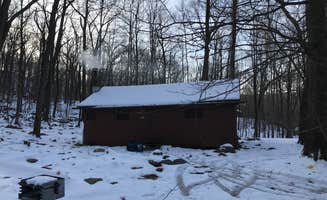
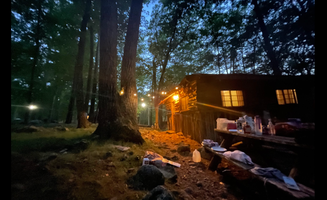
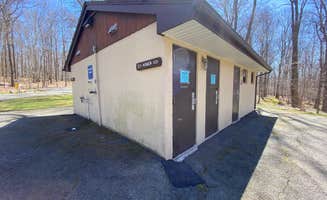
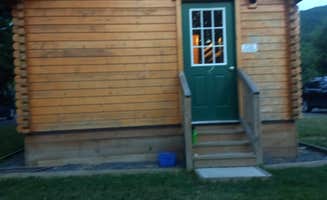
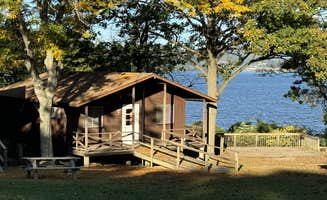
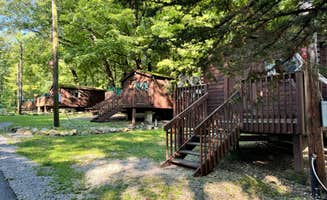
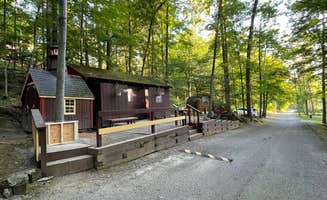
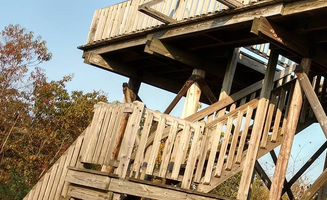
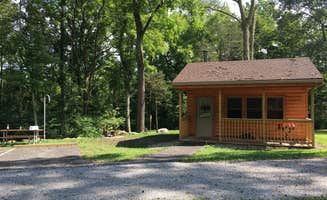
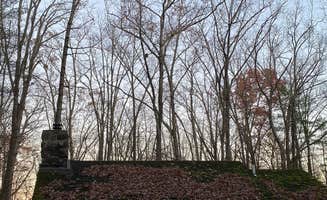
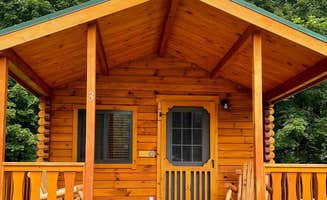
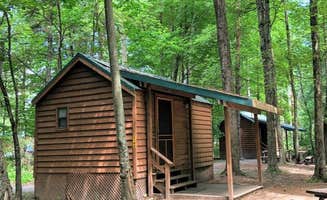
They have rustic cabins. Theae do not have plumbing or heat. It is a step up from cabin camping. They also have a beach behind it.
Rented a cabin in November (#009) and again in December (#008) of 2021. I favored Cabin 8, the kitchen and bathroom were separated from the main room.
The cabins are reasonably priced and well-appointed, if a bit rustic. The interior features are just what you'd expect for getting away for the weekend. THe main room has a bunk bed and two twins, a table with benches, two Adirondack chairs, a wood stove set into a fireplace (some cabins still feature a fireplace only, but these two did not), hot/cold water, electric stove with oven, refrigerator, toilet, bathroom sink, mirror, plenty of hooks to hang jackets and coats, storage cabinets in the kitchen area, overhead lighting, wall outlets, and screened windows.
The doors feature deadbolt locks - so be sure to always take the key or set the lock to be unlocked all the time.
The mattresses are vinyl covered, so you can wipe them down with your own sanitizing wipes. There was hand sanitizer in each cabin as well.
Outside is a picnic table, fire ring, and grill. There are hooks near the door to hang a lantern.
The park office is not nearby, about 2(?) miles away. They sell wood, and there are a few road stands near the campground, but that wood is wet. You'll need to find some birch to get your fire going if, like me, you didn't buy wood on the way (plenty of signs for wood as you approach the park office) and the office was closed upon arrival. I bought wood from a house across the street from the entrance to the cabins and it was damp, but in November, I wasn't complaining, it took awhile but I got a nice blaze going. You need that wood stove to heat up the cabin. Turning on the oven is a help, but not a good solution. The wood stove definitely heats the room up nicely. I went through two bundles of wood in one night, and could have used more in the morning. (There's plenty of fallen wood around but it was damp/raining both times I visited). The second time I took six bundles of wood and used them all from Friday to Sunday morning, and 7 would've have been better.
The trails nearby are varied, read the maps (especially NY NJ Trail Conference Maps) to get an idea of difficulty/elevation. We went in November when there was a light rain that turned into a thunderstorm with hail and sleet! It was certainly an adventure. The area was incredibly peaceful in December with many cabin reservations abandoned due to rain in the forecast. It did rain, but was still a great trip. The photos of the tent sites were taken in December.
This is the first time we decided to forgo tent camping and reserve a shelter at a state park. We had a much better experience than we were expecting! The "shelter" is what we would describe as a "cabin"; four walls, a roof, locking door, locking windows, large picture frame front window, four beds(two bunks), a wood burning stove, and a porch. Even compared to our glamping this was luxury!!
There are eight shelters at Jenny Jump State Park. Shelter 2 is a minute walk from the restroom with sink/shower and water. Shelters 7 & 8 are even closer while 4 & 5 are the furthest, may an extra 5 minutes walk? The dead end means there isn't too much traffic, though the road is right there so you can wave to the other campers heading to the restroom or for hikes. There is a trail head at one of the parking lots. During the day the parking lots filled up and there was some overflow parking for day-hikers across the road. We got to see their dogs, so that was a bonus for us! Otherwise, this shelter is not situated too close to the other shelters and feels very private.
We brought battery-powered lights since there is no electricity. There were coat hooks and a built-in shelf for our snacks, games, and other supplies. There was a picnic table and benches inside. We brought camping chairs for relaxing on the porch. We spent most of our time on the porch; cooking, chatting, and crafting while enjoying the sunshine and breeze.
Oh, this shelter is wheelchair accessible. Some of the others are not.
Its our first stop of many and we wanted to shake out any glitches with our new camper at a public campground. The staff are very helpful and accommodateing. This campground although dated offers all the necessary comforts-Wifi, hot showers, electric etc. Currently, there are various updates occurring: additional sites, new tiny cabins, WIFI and electric are also being modernized. We opted to relocate to a site with less construction occurring and although you can still hear back hoes etc-our view has much improved. We wish there was easier access to bike and hike trails so we didn't have to drive to a location but overall a comfortable and positive experience.
Stayed 2 nights and it was really nice. Camping for summer is pretty limited to Sawmill Lake, as the other locations are for groups or winter camping. Camps are secluded from each other and most if not all have an elevated space to put tents or chairs. Each place comes with a lamp hang, a fire pit, and a picnic table. Bathrooms are spaced out. No running water except for pump founded outside of the bathrooms. Toilets are pump flushed. Showers are only located INSIDE High Point State Park, not throughout the campsites, but entry is free for campers. One hiking trail is accessible in Sawmill campground, 3 others are accessible on the road outside of the campground and the rest are located inside the park. When you arrive you have to check in with the park office for your campsite tag. Hours are 8-4. Park officials come through the campsites pretty regularly, a few times a day which is nice. Areas are clean and well maintained.
Set on a hillside, the campground has three levels. The tent sites all have water & electric, and have a picnic table and fire ring. The sites are fully shaded. Facilities were neat & clean, and there was a covered verandah with string lights, chairs & picnic tables outside the bathroom area.
Campground staff were friendly, and there was a store with firewood, ice and many other conveniences. Wifi was available, and connection was good the entire time I was there.
The campground is convenient to many hikes in the Delaware Water Gap area.
Be aware that the campground doesn't have credit card facilities, but does have an ATM in the store if absolutely necessary.
Campground Review
Stokes State Forest has four campgrounds. The Steam Mill Camping Area is tucked out the of the way and is the most primitive. It is the smallest of the campgrounds with 27 sites only suitable for tents or small trailers/campervans. No pets or alcohol allowed.
The campground has a pit toilet and a well. Each large campsite has a picnic table, fire pit, and lantern hook. Some sites also have a tent platform. Many sites are a bit rocky.
We selected site T219. It was a solid choice: private but close to the toilet and water. Some sites located around the opposite side of the ring back up to a babbling brook. The rushing water will soothe you to sleep.
Remember, this is bear country so proper food storage is a must. Bear lockers are not provided. The area also has ticks and rattlesnakes.
Outdoor activities in the area abound. Go fishing, hiking, biking, horseback riding, kayaking, and more. There are 21 marked trails that cover over 63 miles within the boundaries of Stokes State Forest. Twelve miles are part of the Appalachian Trail. Pick up a hiking map at the park office or download the Avenza Maps app.
This visit we hiked the Tillman Ravine trail (tip: make the trail a loop and visit both the ravine and the nearby old cemetery).
You can also drive or hike to Sunset Mountain Scenic Overlook for a view of High Point Monument. High Point Monument is the highest elevation in New Jersey and is located in High Point State Park which borders Stokes State Forest on the north. High Point State Park also offers camping, hiking, sightseeing opportunities. And, on the western border of Stokes State Forest is the Delaware Water Gap National Recreation Area. So, there is lots of outdoors to get out and explore!
Product Review
We camped at the Steam Mill Camping Area in Stokes State Forest in our campervan over a chilly autumn weekend. We had the opportunity to cook some soup on our stovetop and chill out by the campfire. And, as Rangers for The Dyrt, we get products to test from time to time so we were psyched to try out some new dinnerware and cutlery. This included the FlexiBowl and GoBites from humangear.
What made these humangear products pretty awesome? Well, the fun colors to start. I mean, seriously, my orange bowl rules. The FlexiBowl also has some neat features: it’s flexible - just like the name suggests - and foldable. The bowl can be squished and stuffed anywhere. And, the top section can be folded down to create a smaller bowl. The FlexiBowl is versatile yet durable. It held my hearty, warm soup just perfectly.
I paired the FlexiBowl with one of the GoBites utensils (the Uno model). The Uno model is my favorite - it has a fork on one side and a spoon on the other side. Very simple and convenient. The other GoBites models include the Duo (separate fork and spoon that can snap together) and the Trio (a fork, spoon, and knife - with bottle opener - in a case).
PRO TIP: I keep the Trio GoBites model in my travel pack at all times. It recently came in handy on a (non-camping) trip to Sardinia. The knife on the Trio allowed me to slice some delicious local cheese to pair with bread, jam, and wine that was purchased from the grocery store. YUM.
Having been here on a few occasions I will say it is def a beautiful spot in many regards. However, there are some downsides.
Positives: sites are decent sized with fire pits and picnic tables. easy access to hiking, convenient to a beautiful vineyard, peaceful region, and the most amazing wolf preserve is right next to you.
Negative: limited access to firewood. sites are picked clean, quiet hours are strongly enforced- which can be a good thing depending upon who you are, the lake is anything but refreshing.
Delaware Water Gap was a massive campground that was incredibly well kept and had spaces for both RVs and primitive camping. The site was very kid and pet friendly, outfitted with both a pet and children's playground(see pictures and videos). The primitive sites were separated from the RV area which is nice because it felt like we had more privacy that way. Each site had its own fire pit as well. If you stay here, be aware of the wild grouse that roam the whole campground!
Cabins near Wanaque, New Jersey sit within the rugged highlands region where elevations range from 400-1,300 feet. The terrain features mixed hardwood forests, rocky outcrops, and numerous small lakes formed by glacial activity. Winter temperatures can drop below freezing from December through February, making cabin accommodations particularly valuable during colder months when tent camping becomes impractical.
Hiking at High Point State Park: The state park features trails ranging from beginner-friendly paths to challenging sections of the Appalachian Trail. "Been here a dozen times! Great hiking for all abilities. Free camping at stone shelters. Beautiful lakes all over the place," notes one visitor to The Stephen & Betsy Corman AMC Harriman Outdoor Center.
Swimming at Sebago Lake: The beach area at Sebago provides a refreshing break during summer months. "Sebago has a huge lake and great beach area. It was perfect for lounging and swimming in during a hot summer day," reports a camper at Sebago Cabin Camp. Lake access is typically available from Memorial Day through Labor Day.
Explore Tillman Ravine: Located within Stokes State Forest, this geological formation offers a unique hiking experience approximately 30 miles from Wanaque. "We hiked the Tillman Ravine trail (tip: make the trail a loop and visit both the ravine and the nearby old cemetery)," recommends a visitor who enjoyed the forest's natural features.
Kayaking on Panther Lake: Multiple rental options are available for water recreation. "We had a great time fishing on the lake. Spots are spacious and campers were spread out throughout the large campground," mentions a guest at Great Divide Campground. Kayak rentals typically cost $15-20 per hour.
Privacy between sites: Many cabins offer adequate separation from neighbors. "Sites had room to move and it was quiet and peaceful. Kids had lots of fun on the free kayaks and pool," notes a camper about their experience at Great Divide Campground. Most cabins are spaced at least 30-50 feet apart.
Access to wilderness: The forested settings provide immediate nature immersion. "My fiancé, dog, and I have been going here for over 2 years and we love it. The campground is small but also secluded. We always hike to the lake here, it's a very easy hike and also very peaceful," shares a visitor to Mahlon Dickerson Reservation.
Proximity to NYC: Many cabin locations offer wilderness experiences without long travel times. "Close enough to the city, far enough to enjoy the nature. Expect crowds," warns a visitor to Sebago Cabin Camp, noting the popularity of these accessible getaways approximately 30-45 miles from urban centers.
Wildlife viewing: Animal sightings add to the cabin experience. "The lake is very peaceful, and home to beavers we watched from the dining hall patio," reports a camper at The Stephen & Betsy Corman AMC Harriman Outdoor Center, where wildlife observation opportunities are common during morning and evening hours.
Reservations essential: Demand exceeds supply, particularly for cabins. "Cabins are 'rustic' - but there's what you need: cots, electricity, a fridge. Ignore the hotplate and just cook on a fire or other outdoor set up," advises a camper at Sebago about managing expectations for amenities.
Winter limitations: Many facilities reduce operations during colder months. "The cabins are reasonably priced and well-appointed, if a bit rustic. The interior features are just what you'd expect for getting away for the weekend," notes a visitor at Stokes State Forest, where winter cabin rentals require additional preparation.
Bring essential supplies: Most cabins provide minimal furnishings. "The site was very loud (dance music) until after 11pm. Quiet time at 10pm. Great site for a party, try to stay away from this end of the site or choose a site away from other bookings if you'd like quiet," suggests a camper about managing noise levels at certain locations.
Bear safety required: Proper food storage is mandatory in this region. "Keep your food in the dry bag and away from the tent or benches provided or face the packs of fearless racoons at night," warns a visitor about wildlife encounters that can occur even at established cabin sites.
Choose cabins with separate sleeping areas: Layout matters for family comfort. "Rented a cabin in November (#009) and again in December (#008) of 2021. I favored Cabin 8, the kitchen and bathroom were separated from the main room," shares a visitor to Stokes State Forest, noting how room division improves family stays.
Seek out kid-friendly activities: Scheduled events enhance family experiences. "They have a beach behind it. Ranger Joe is with the kids and they have wood for purchase on site," mentions a visitor to Sebago about staff-led programming available during peak season.
Look for cabin clusters: Group bookings work well for extended families. "The campground is small but also secluded. We always hike to the lake here, it's a very easy hike and also very peaceful," notes a visitor about Mahlon Dickerson's layout that accommodates multiple family units while maintaining nature access.
Check shower access: Bathroom facilities vary widely between cabin locations. "This county park has large, wooded campsites with electric and water. It's beautiful and quiet, and close to beautiful hiking trails, lakes, and other outdoor recreation opportunities," reports a frequent visitor to Camp Glen Gray about amenity access.
Electric hookup availability: Not all cabins offer consistent power. "Very clean and quiet. Website lists water hook ups at long distances but they have hose reels to help with that. Our site (15) said 75' however the 50' hose reel made it to our RV connection," explains a visitor to Mahlon Dickerson Reservation about managing utility connections.
Site leveling challenges: Terrain can present setup difficulties. "Located in the Skylands of New Jersey, Mahlon Dickerson Campgound is a perfect place to spend a few nights or a couple of weeks. The campsites are paved and mostly level," notes another visitor, emphasizing the importance of properly prepared sites for larger vehicles.
Navigation considerations: Access roads vary in quality and width. "Easy to navigate our 38 ft. RV. Easy to dump and fill. Peaceful. Close to train to N.Y. City," shares a visitor about the accessibility at certain cabin locations that also accommodate larger recreational vehicles.
Frequently Asked Questions
Which is the most popular cabin campsite near Wanaque, NJ?
According to TheDyrt.com, the most popular cabin campground near Wanaque, NJ is Mahlon Dickerson Reservation with a 4.7-star rating from 18 reviews.
What is the best site to find cabin camping near Wanaque, NJ?
TheDyrt.com has all 52 cabin camping locations near Wanaque, NJ, with real photos and reviews from campers.
Keep Exploring